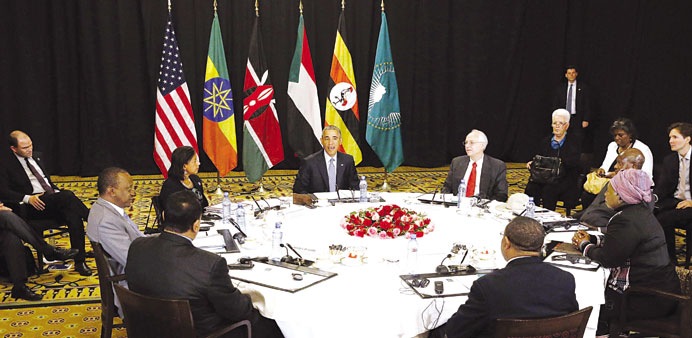US President Barack Obama holds a meeting on South Sudan and counterterrorism issues with African heads of state at his hotel in Addis Ababa yesterday. Pictured at the table (clockwise from the top centre) are: Obama, US Special Envoy to Sudan and South Sudan Donald Booth, Uganda’s President Yoweri Museveni, African Union Chairperson Dlamini Zuma, Ethiopia’s Prime Minister Hailemariam Desalegn, Sudan’s Minister of Foreign Affairs Ibrahim Ghandour, Kenya’s President Uhuru Kenyatta and US National Security Adviser Susan Rice.
Reuters/Ramallah
South Sudan’s warring factions may face further international pressure if they do not reach a peace deal by August 17, US President Barack Obama said yesterday, before talks on the conflict with east African leaders.
The South Sudanese government responded by saying additional sanctions could harm the peace process.
Obama, in Ethiopia on a two-nation Africa tour, held talks in Addis Ababa to discuss the conflict raging between President Salva Kiir’s government and rebels commanded by Riek Machar.
Obama and leaders from Kenya, Ethiopia, Uganda, Sudan and the African Union discussed options that included sanctions and a “regional intervention force” if the warring parties do not reach a peace deal by August 17, a US official said.
However, the group did not reach a consensus on what to do if the deadline comes and goes as others have done, the official added.
“If we don’t see a breakthrough by the 17th, then we have to consider what other tools we have to apply greater pressure on the parties,” Obama told a news conference with Ethiopian Prime Minister Hailemariam Desalegn, who has hosted peace talks.
But Ateny Wek Ateny, spokesman for Kiir, told Reuters: “What we need from the international community is support, so if more measures come it will jeopardise the chances of the people of South Sudan”.
Rebel spokesman James Gatdet welcomed Obama’s comments and urged the government to tackle key obstacles, saying “peace is possible”.
The United States and the European Union have already imposed sanctions on individual commanders from both sides.
Thousands have been killed and more than 2.2mn displaced since fighting broke out in December 2013. Both sides have been accused of human rights abuses and indiscriminate killings, which have often been carried out along ethnic lines, with Machar’s Nuers pitted against Kiir’s powerful Dinkas.
Hailemariam said yesterday’s meeting should send a “strong signal”. “The people are suffering on the ground and we cannot let this go on,” he said.
The regional grouping IGAD, which includes Ethiopia and has been mediating, has threatened sanctions in the past, but more recently said they would not help.
Western diplomats have pushed countries in the region to put more pressure on the South Sudanese to make peace.
The United States, Britain and Norway were among the main Western states that sponsored South Sudan when it seceded from Sudan in 2011.
Those at the talks included Ugandan President Yoweri Museveni, Kenyan President Uhuru Kenyatta, Sudanese Foreign Minister Ibrahim Ghandour and the chair of the African Union Commission, Nkosazana Dlamini-Zuma.

